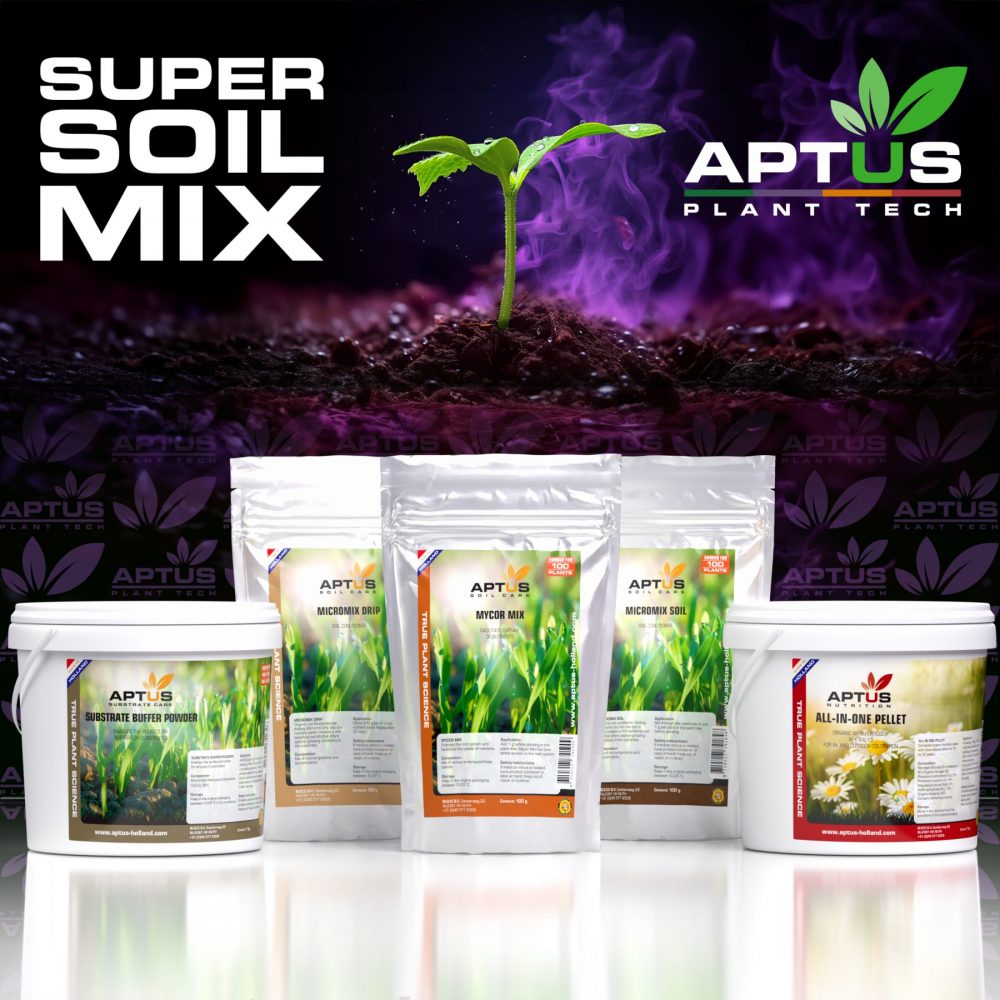Aptus has always been about precision, efficiency, and quality, and now we’re taking it to the next level. Meet ALL-IN-ONE PRO—a game-changing 100% water-soluble, highly concentrated mineral fertilizer designed for professional growers. What Makes ALL-IN-ONE PRO Different? Unlike traditional mineral nutrients, ALL-IN-ONE PRO is a finely tuned, complete formulation containing all essential elements needed for […]
For years, Aptus has been a trusted name in plant nutrition, delivering industry-leading results in quality, yield, and efficiency. Now, we’re making it even easier to choose the right feeding program for your setup. Introducing our new structured feeding programs—same premium quality, now with a clearer approach tailored to different cultivation styles. One Brand, Three […]
Growers, meet the Aptus Super Soil Mix! Designed to provide an optimal environment for plant growth, this all-organic mix ensures your plants thrive with a well-balanced nutrient profile, and the best of all: All you need to do is water! No bottled nutrients required, just mix the products with your substrate and you’re ready to […]
In gardening, maintaining the right pH level in your growing medium is key to helping your plants reach their full potential. Whether you’re using soil or coco coir, fluctuations in pH can affect how well your plants absorb nutrients, their health, and how much they yield. Luckily, with Aptus Substrate Buffer solutions – both Powder […]
Only a select few reign supreme in the vast expanse of plant care. Today, we pull back the curtain to reveal The Three Kings – Regulator, Topbooster, and Startbooster – each bearing the hallmark of excellence from Aptus Plant Tech. They’re here to turn your garden into a botanical kingdom, making these products the crown […]
With over 20 products to choose from it can be daunting to buy your first set of Aptus products, because what do you need exactly? In this blog, we’ll show and explain the essentials of the Aptus product line. So, we want to feed our plants everything they need to grow big and strong. That […]
One of the most common questions new Aptus users have is: What EC value should I keep in my nutrient solution? Unfortunately, there’s no easy answer here, as it’s dependent on a lot of variables like crop, climate, and growth phase, but we’ll attempt to clear some of the fog surrounding EC in this article! […]
Enzymes are agents of change – Catalysts for biochemical reactions. In the human body, enzymes are involved in the digestion (breakdown) of food into molecules that are small enough for your body to absorb. Without enzymes, the human body wouldn’t be able to take up the proper amount of nutrients. So, if your body would […]
We all know pH is an important measurement for any fertilizer input. Most of us also know that the pH of the medium is a big factor in the availability and absorption of nutrients. What only few understand is the importance of the pH of the plant itself, so that’s what this article is all […]
In our last article, we determined that plants actually request attacks from pests and pathogens. Having established that, the next question becomes: How do we get plants to send the ‘good’ signals and not the ‘bad’ in a controlled environment? That’s where Brix comes in! (Didn’t read the article on ‘Plant Signals’ yet? Click here) […]














